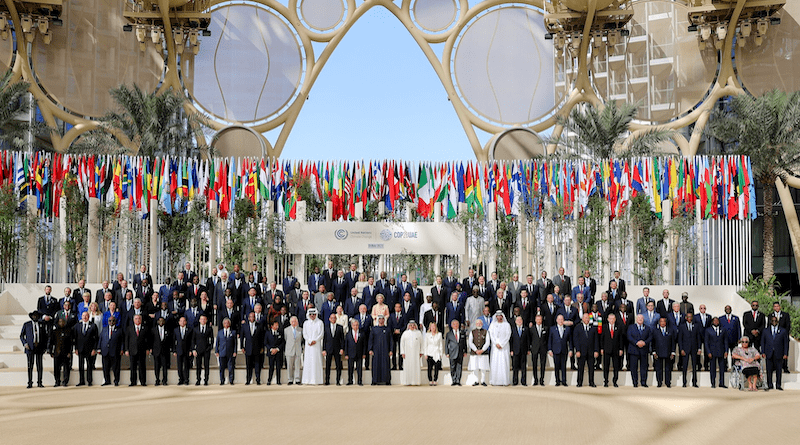Key Outcomes Of COP28 – OpEd
By Shah Khalid
The 2023 United Nations climate conference, COP28, convened in Expo City, Dubai, marked a pivotal moment for the international community grappling with the urgent need for climate action. This piece delves into the nuanced outcomes, controversies, and challenges that defined COP28, shedding light on the implications for global climate efforts.
COP28 unfolded against a backdrop of heightened expectations and controversies, with Sultan al-Jaber’s appointment as president and lingering questions about his ties to the oil industry. Additionally, countries faced scrutiny over their progress in reducing carbon emissions, setting the stage for intense negotiations.
Key Takeaways from COP28
Disputed Agreement on Fossil Fuels
The conference witnessed an extended debate over the urgency of phasing out fossil fuels, resulting in the adoption of the Global Stocktake agreement. However, controversies arose from changes in language, with the final text urging countries to “transition away” from fossil fuels, leaving concerns about ambiguity and varying interpretations.
Approval of the “Loss-and-Damage” Fund
A positive start saw the approval of a “loss and damage” fund meant to assist vulnerable communities and nations grappling with climate disasters. However, developed nations’ contributions fell short, sparking criticism and raising questions about the fund’s effectiveness.
Discussion on Paris Agreement Progress
The pressing need for new climate plans and robust multilateral climate change mitigation projects was underscored by the first assessment of countries’ progress toward Paris Agreement goals. COP28 laid the groundwork for continued assessments, emphasizing the crucial role of the Paris Agreement in motivating renewed climate efforts.
Global Finance Challenges for Renewables
Despite endorsements for increased reliance on renewable energy, financial pressures on developing nations posed significant challenges. Rising interest rates and debt distress in developing countries hindered their ability to invest in climate change measures, highlighting the need for global financial restructuring.
Controversies and Highlights at COP28
Accusations Against Sultan al-Jaber
Sultan al-Jaber faced accusations of denying climate science, leading to concerns about his presidency. Responses from conference participants varied, with some defending al-Jaber’s understanding of climate science.
OPEC’s Influence and Pressure
OPEC issued a letter urging members to reject texts targeting fossil fuels, emphasizing its opposition to such measures. The group labeled campaigns against fossil fuels as politically motivated, showcasing the complexities of aligning global oil producers with climate goals.
Protests on the Sidelines
Despite the UAE’s prohibition of demonstrations, several groups held protests addressing issues like the Israel-Gaza war and political prisoners. The allowance for peaceful assembly reflected the delicate balance between climate activism and geopolitical concerns.
Looking Ahead to COP29
Selection of Azerbaijan as the Host
Azerbaijan’s announcement as the host for COP29 sparked early criticism due to concerns about its oil production and human rights record. Activists raised objections, highlighting the ongoing tension between environmental priorities and geopolitical considerations.
Conclusion
As COP28 drew to a close, the outcomes and challenges became clearer. The conference set the stage for continued climate action, but controversies and gaps in commitments underscored the complexities of global cooperation. Looking forward to COP29, the international community must grapple with these challenges to make meaningful progress in the fight against climate change. The journey toward a sustainable future demands collaborative and thoughtful efforts to navigate the intricate landscape of global climate cooperation

